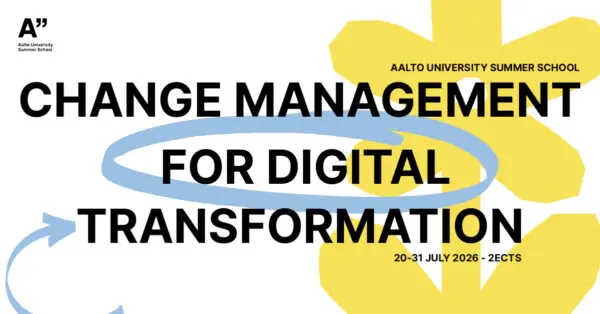
Helsinki, Finland
Change Management for Digital Transformation
When:
20 July - 31 July 2026
Credits:
2 EC
Read more
Business & Entrepreneurship
When:
18 July - 05 August 2022
School:
Institution:
Maastricht University
City:
Country:
Language:
English
Credits:
6 EC
Fee:
998 EUR

Organisations and companies are confronted with strategic issues such as increasing speed of innovation, cultural diversity, need for differentiation, increasing competition, rising energy costs and stricter regulations on CO2 emissions, etc. These issues are not isolated. They are connected to a world of rapidly changing technological, political, economic, and environmental developments. Understanding the business logic at hand is important, but it is not enough. If we want to create a better world for our children and ourselves, we should think more in terms of leadership and change.
We will introduce examples of leadership that changed the rules of the game, such as Ellen MacArthur’s ambition to change the world towards a circular economy, by building a framework for an economy that is restorative and regenerative by design. And Jamie Oliver, the British Chef who tried to change the food culture in the USA through his TV-show the Food Revolution.
We think that this type of leadership is not about charisma or personal characteristics, but about personal dedication to a goal or vision far beyond personal interests. This type of leadership is embedded ‘in context’. This implies that leadership is not a personal characteristic but a part of a relationship among people in a community, where qualities like trust, playfulness, and creativity are involved.
The case studies form an input to reflect on personal leadership issues. Students are invited to share and discuss their personals sources of inspirations.
Kees van den Hombergh
Introduction to micro-economics. Basic knowledge of business administration, organization, strategy and finance. Interest in organisational strategy, change, psychology and global developments.
By the end of this course students are able to:
• Understand what leadership means in one’s personal life and in business;
• Describe and discuss leadership as a ‘sensitizing concept’; related to different leadership theories;
• Show and explain that leadership is not a phenomenon in itself, but always ‘in context’;
• Explain why leadership is an often missing, but necessary element in business practice and is strongly related to strategy and change management;
• Integrate leadership issues in business case studies dealing with strategy and change in industries and business companies;
• Contribute to leadership issues (business and/or personal related) as presented and discussed in class;
• Understand that leadership is part of a relationship between people in a group context where feelings of fear and trust play a role;
• Become aware of the role of ethics in business;
• Participate in dialogues in order to investigate problems with an open mind;
• Connect leadership with personal awareness and growth;
• Speak in public about personal issues and relate these issues to personal contexts like ‘comfort zone’, ‘learning or stretching zone’ and/or ‘panic zone’.
Fee
998 EUR, Tuition fee
When:
18 July - 05 August 2022
School:
Institution:
Maastricht University
Language:
English
Credits:
6 EC

Helsinki, Finland
When:
20 July - 31 July 2026
Credits:
2 EC
Read more

Aarhus, Denmark
When:
27 July - 12 August 2026
Credits:
5 EC
Read more

London, United Kingdom
When:
09 July - 20 August 2026
Credits:
4 EC
Read more